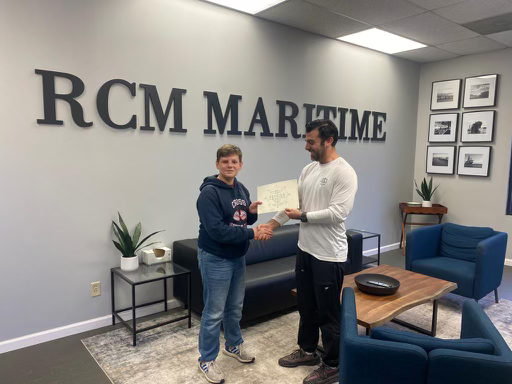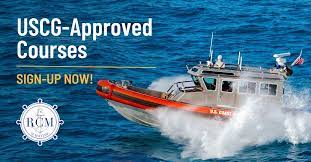"Well, that was the week that was," an old BBC Television series whose title springs to mind. I put my soon-to-be seafaring family through the mill of Basic Training under commercial US Coast Guard practices and codes. Like many other nations, the British included, the US may no longer have such an extensive merchant marine, but they have never forgotten how to be top-notch sailors. We needed some of that cultural knowledge.
The US Coast Guard Trainer Charleston
First of all, a shout-out to the training providers. RCM Maritime of Charleston, South Carolina.
USCG Training Center
A USCG-approved and certified training center providing commercial courses and backup for aspiring and existing merchant mariners on the US East Coast. When we initially contacted Ross Mery, the owner, we learned that there was a minimum age limit of 16 ... "our youngest is 14" two phone calls later (where I suspect the USCG played a role). Our son, my wife Sebrina, and myself accepted as Tail End Charlie. If you don't ask, you don't get into this world.
USCG Training - First Aid and CPR
Our initial foray was "First Aid and CPR." We all sat through this three-day course, and for some reason, "Dad" was always a practice victim until it came time to strap someone into the evacuation stretcher. Vengence is quite sweet when the target is entirely incapacitated. Time passed quickly enough, and we were judged sufficiently trained and passed.
Growing a little more confident, we then targeted a more demanding prospectus.
USCG Courses, OUPV 6-Pack
I took about 60 hours of instruction before sitting my OUPV or 50T commercial USCG Captains License, colloquially known as a Six Pack. In the grand scheme of life, this is no big deal, except that we don't know what we don't know until we know it. In other words, all knowledge is helpful in some way. The last day was chart plotting, and I'm pretty quick at that, so I saved sufficient time to take the final test in the afternoon. It is a multiple-choice test, and they slip into quite awkward scenarios. I can't say my knowledge of the Rules of the Road (COLREGS 72) is exactly perfect, but I managed to score 100% on the Navigation Section, so saving face. Pass rates are between 70% on most subjects and 90% on Navigation and COLREGS. Re-testing is allowed. I will also sit for the "OUPV to Master 100T" Upgrade at the end of April to round out the qualification. TWIC Card is secured (Transport Workers Identity Card for docks in the USA), and the required drug test and medical will be this coming Friday.
Able Seaman STCW ( USCG Able Seaman Course)
Sebrina and Rhys took a different route. They took "Basic Seamanship and Watchkeeping" (STCW), a modified subset of the USCG Able Seaman Course. Their course included Basic Watchstanding, Rules of the Road, Firefighting, Personal Survival & MoB, Anchoring, Docking, Line Handling, and Safety. It is partly based in the classroom but includes much practical demonstration and practice. I found time to watch some of the firefighting. Seeing both of them dressed as a cross between a Minion and Donald Duck was quite amusing at the time though Sebrina refused any attempt at photography. Rhys was more willing. Passing this course was at the instructor's judgment, in our case Ross. It was not a slam dunk, but ultimately successful.
Does this and similar work make us all a team? Well, no, but that was not the intent. Does it help reduce the fear of the unknown and provide a platform for further learning? Most certainly, yes. It also reduces my anxiety with a novice crew, which can only be good. Vanguard will be our life and our tiny world for a good while. It will serve us well to make that experience as positive as possible. Part of that is the preparation we put in beforehand, and before we need to use that knowledge in anger.
Chris Leigh-Jones
Ross Mery - RCM Maritime - HERE
A USCG OUPV differs from a professional deep-sea merchant marine navigators license. Location and tonnage are restricted and it is relatively easy to get based on sea time and a short, instructive test. In my earlier days at sea, rising through the ranks as a Navigator or Engineer took considerably longer, with frequent, more demanding testing. They both have a place, but it's not the same or equivalent. A reason why crew who go this route tend to be younger than those trained as deep sea mariners.
Look Here for a recent copy of COLREGS 72, acknowledgement USCG.











